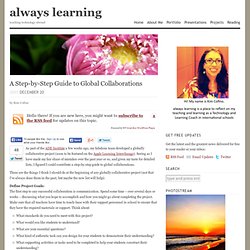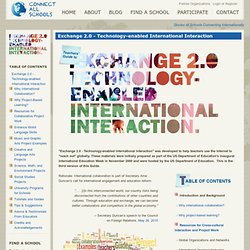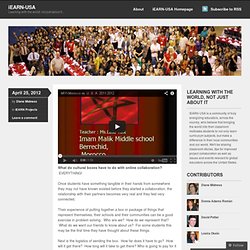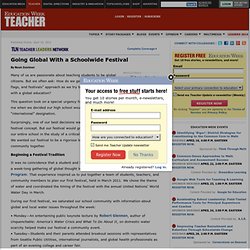

A Step-by-Step Guide to Global Collaborations. As part of the ADE Institute a few weeks ago, my fabulous team developed a globally collaborative project (soon to be featured on the Apple Learning Interchange).

Seeing as I have made my fair share of mistakes over the past year or so, and given my taste for detailed lists, I figured I could contribute a step-by-step guide to global collaborations. These are the things I think I should do at the beginning of any globally collaborative project (not that I’ve always done them in the past, but maybe the new list will help): Define Project Goals: The first step to any successful collaboration is communication. Spend some time – over several days or weeks – discussing what you hope to accomplish and how you might go about completing the project.
Make sure that all teachers have time to touch-base with their support personnel in school to ensure that they have the required materials or support. ETT iPad Summit 2012 - Curating 24/7 Learning Networks - iOS in Ed. Visualize the World: Museum Resources for Global Learning - Global Learning. MrsSchmidtB4: We love to Skype w/other c... OWYP: Have you see our 3-minute... MrsSchmidtB4: I found Clustr Map to be l... MrsSchmidtB4: We take part in the Studen... Exchange 2.0 - Technology-enabled International Interaction.
Rationale: International collaboration is part of Secretary Arne Duncan’s call for international engagement and education reform: “. . .

[I]n this interconnected world, our country risks being disconnected from the contributions of other countries and cultures. Through education and exchange, we can become better collaborators and competitors in the global economy.” -- Secretary Duncan’s speech to the Councilon Foreign Relations, May 26, 2010 The Teacher's Guide to International Collaboration was developed to help teachers use the Internet to "reach out" globally. This Guide has been prepared as part of the Department of Education's effort to expand global awareness through collaboration between students and teachers in the US with their peers around the world. In each section of this Guide we have also provided links to elementary, middle and high school projects and links to organizations that are involved in international education via the Internet and Web 2.0 tools.
The Global Classroom Twitter Chats - Chat Archives. Fasten Seat Belts - Videos About Cultural Norms#.T9oLKVROOZc.twitter. What Do Cultural Boxes Have to Do with Online Collaboration? What do cultural boxes have to do with online collaboration?

EVERYTHING! Once students have something tangible in their hands from somewhere they may not have known existed before they started a collaboration, the relationship with their partners becomes very real and they feel very connected. Their experience of putting together a box or package of things that represent themselves, their schools and their communities can be a good exercise in problem solving. Who are we? How do we represent that? Next is the logistics of sending the box. However nothing beats the arrival of the box from their online friends.
Culture box from Bahrain “My students are so happy with it and would like to thank the girls for the presents they sent! iEARN projects that exchange culture boxes or packages are My Identity, Your Identity Students talk about their traditional celebrations and the famous monuments and landmarks in their countries. The Particle Theory of Global Competence - Global Learning. Worth Fighting For - Global Learning. Going Global With a Schoolwide Festival. Published Online: April 10, 2012 By Noah Zeichner Many of us are passionate about teaching students to be global citizens.

But we often ask: How do we get beyond the “food, flags, and festivals” approach as we try to provide our students with a global education? This question took on a special urgency for my colleagues and me when we decided our high school would pursue an “international” designation. Surprisingly, one of our best decisions was to steer straight for the often-criticized festival concept. Beginning a Festival Tradition It was no coincidence that a student and I had just attended the Aspen Ideas Festival, a week-long gathering of global thought leaders, as part of the Bezos Scholars Program.
During our first festival, we saturated our school community with information about global and local water issues throughout the week: Building on Our Success. Gaming: Leveling Up Global Competence - Global Learning.